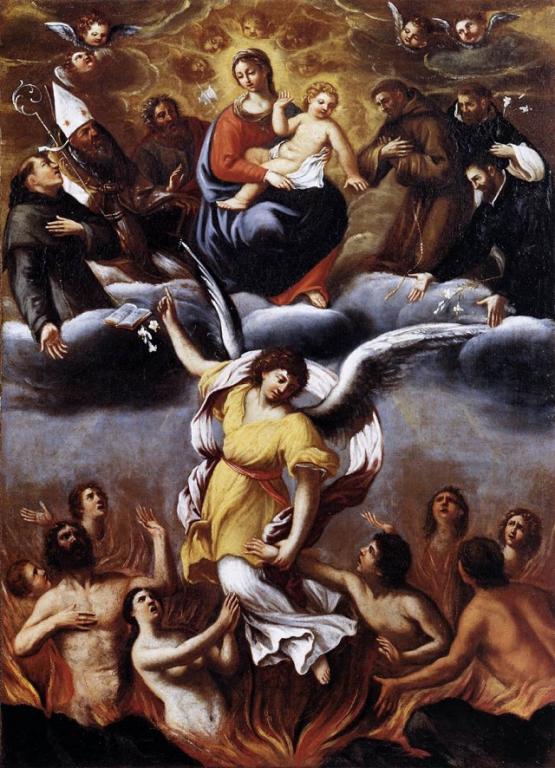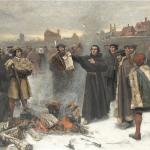
I happened to notice a very interesting piece on the Lutheran blog Here We Stand, from “CPA”, with whom I have had several dialogues. It’s entitled simply “Prayers for the Dead.” CPA opened the article thusly:
In what Martin Luther regarded as his final confession of faith in his 1528 work against the Zwinglians, Confession Concerning Christ’s Supper, he wrote as follows:
As for the dead, since Scripture gives us no information on the subject, I regard it as no sin to pray with free devotion in this or some similar fashion: ‘Dear God, if this soul is in a condition accessible to mercy, be thou gracious to it.’ And when this has been done once or twice, let it suffice. For vigils and requiem masses and yearly celebrations of requiems are useless, and merely the devil’s annual fair. (Luther’s Works, vol. 37, p. 369)
Luther’s approval of prayers for the dead given out of free devotion was shared in Melanchthon’s Apology to the Augsburg Confession (article XXIV, 94), where he wrote:
Now, as regards the adversaries’ citing the Fathers concerning the offering for the dead, we know that the ancients speak of prayer for the dead, which we do not prohibit; but we disapprove of the application ex opere operato of the Lord’s Supper on behalf of the dead.
CPA himself makes a rather interesting argument. But he thoroughly denies purgatory, which he claims “has no Biblical foundation”. I beg to differ: in my first book, A Biblical Defense of Catholicism (1996), I outlined no less than 25 distinct biblical arguments for purgatory; supported by many Church Fathers, and also many other related Bible passages.
He goes on to argue that one can pray for the eternal destiny of persons who have already died, because God is outside of time and thus that such prayers are applied retroactively for the deceased person’s benefit. I’ve made the same argument before (about prayer being out of time because God is). And I agree with this application of the principle. Concluding with stirring words that I found quite eloquent and moving, CPA stated:
Far more typical is the loyal Christian woman in a mainline church who loved Christ but always indignantly denied the existence of hell, the occasional church-goer who is put into a coma by a stroke and dies without regaining consciousness, the Baptist missionary who spends all her strength winning souls for Christ and taught her converts to reject God’s word concerning baptism and the Lord’s Supper, the devout Christian man with an undiagnosed depressive condition who disappears for a day and is found dead of a self-inflicted gunshot wound, the grandmother who slipped into mindless senility years before her death, the writer who longed desperately for a faith she mournfully believed that God had never given her, the man of affairs who did great good for humanity and is cut down suddenly just as he seemed to be returning again to the faith of his fathers, a son baptized and raised in the faith who was drowned on a canoing trip with his live-in girlfriend. . . .
In such cases only simple-minded dogmatists would dare say for sure whether they are in heaven or hell. On what grounds then are we denied the right to pray for those we love, that in their moment of death they might remember the Gospel promise of God in Christ and cling to it? And if God tells us to pray persistently for all the concerns of our heart and especially for the salvation of all (Luke 18; Philippians 4; 1 Timothy 2), how can He be angry when we pray for the thing that weighs most on our hearts, something about which we genuinely do not know His will? And who can be confident denying that the prayers of loved ones, whenever they are offered, before, during, or after death, do not by God’s appointment, comfort and uphold those facing death without preparation and without full knowledge of God’s grace?
For these reasons, for many years now I have believed that prayers for the dead (which are really prayers for those in the hour of death) are a true Christian practice, completely consistent with the evangelical faith, and have practiced this. As I have seen (on Luther Quest of all places), I am not alone in doing so.
I also found the comments fascinating, as several Lutherans and other Protestants agreed that it was not contrary to the Bible or the Christian faith to pray for the dead.
In my book, The Catholic Verses (2004), I have an extended treatment (pp. 169-174) of St. Paul and what I argue are his prayers for the (likely) dead man, Onesiphorus (which also appeared in briefer form in my chapter on purgatory, in A Biblical Defense of Catholicism — pp. 141-143).
So (I maintain) Paul prayed for the dead, as did our Lord Jesus, when He raised the dead on a few occasions. That was my “new” argument (which actually came from a great insight from my wife Judy). The practice, therefore, is supported by explicit biblical evidence. Why, then, we ought to ask, do so many Protestants reject the practice (seeing also that it was very widespread in the early Church)?
***
(originally 3-22-05)
Photo credit: An Angel Frees the Souls of Purgatory (c. 1610), by Ludovico Carracci (1555-1619) [public domain / Wikimedia Commons]
***













